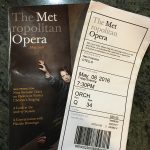This past weekend I attended the final performance of Giuseppe Verdi’s “Otello” at the Metropolitan Opera. I had to attend an opera as a requirement for my opera class, which fortunately lined up perfectly with our readings of Othello in class. Though the story was lacking a few details that I have already read in Shakespeare’s Othello, the overall story was the same. It was very interesting to see the changes that were made, such as Verdi’s decision to completely taking out Act 1 where we see Desdemona’s father learning about her eloping. I wondered why Verdi decided to make these changes, but I think it could be because he wanted to condense the story and make sure that the grand, emotional scenes took precedence over scenes that he felt maybe weren’t as important to the overall story. It was really great to see this story performed on stage with such beautiful music, sets and costumes. It helped give me a better understanding of the overall story that I may have missed from just reading the play. It was sung in Italian and they had “Met titles” or subtitles that were on the back of the chair so that I could read the translation throughout the performance. I thought that this may detract from the experience by having to read and try to see the action of stage, but it wasn’t a problem. This was my first time at the Met and it was an amazing experience. I definitely will be going back to see another opera when I have a chance.
All posts by n.cooke
Othello Act III
Act III of Othello is where we see Iago’s devious plan to hurt Othello finally taking place and we see that the major themes of this play are jealousy and deception. At first, Iago insinuates that there is a relationship between Desdemona and Cassio, but wont offer Othello any proof. Iago tells Othello, “It is the green-eyed monster which doth mock/The meat it feeds on.” (Act 3, Sc. 3, 196-197) In this instance Iago is referring to Othello’s jealousy towards Cassio, and is comparing Othello to an animal that is playing with his victim. I found this line to have a double meaning as Iago could also be seen as the green-eyed monster that is toying with Othello’s emotions by slyly planting this idea of Desdemona’s infidelity in his head.
The handkerchief seems to be symbolic of Desdemona and Othello’s love as it was the first gift that he had given her. This handkerchief is then stolen and becomes the evidence that Iago needs to convince Othello of Desdemona’s unfaithfulness. At this point I feel that this gift becomes representative of Othello’s feelings that Desdemona has lost her love for him. When it ends up in Cassio’s hands, he asks Bianca to replicate the pattern, to which she immediately feels jealousy towards the owner of the handkerchief and demands to know who gave it to Cassio. This symbol seems to be what brings all of the characters of the story together, but what will eventually end up tearing Othello and Desdemona apart.
- Why do you think Iago kept stringing Othello along before actually giving him the proof (the dream and the handkerchief) of Cassio and Desdemona’s affair?
- As we have seen already, Iago treats his wife Emilia poorly, so why would she be so willing to help her husband steal Desdemona’s handkerchief without knowing what it will be used for?
- Towards the end of this act we see that Iago finally gets the promotion he wants, so why doesn’t he put an end to his plan after that and try to convince Othello not to kill Desdemona?
